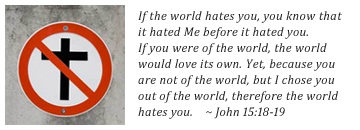It stared back in March with the forced closing of 700 churches. That number has now reached 8,000 as Rwanda’s secular government seems to be growing increasing hostile to Christians.
Rwanda is a fairly small African nation, roughly the size of Massachusetts in area, with a population of about 11 million. Since the civil war in the nineties – and the infamous 1994 genocide – the country has been relatively peaceful. That’s probably due in no small part to the authoritarian tendencies of the secular government. Imagine for instance a mandatory, countywide clean-up on the last Saturday of every month; in Rwanda it’s a practice known as “Umuganda” ~
Rwanda institutionalized Umuganda in its current form in 2009. It’s compulsory for all able-bodied people ages 18 to 65, and the president and Cabinet members pitch in, too, for this monthly community service […]
Police monitor the streets and can stop Rwandans who aren’t participating and make them clean up on the spot. Rwandans who don’t participate in the cleanup can be fined 5,000 francs, nearly $6, not a small sum when average income is about $150 a month.

Much like Mussolini made the trains run on time, President Paul Kagame runs a tidy country.
Earlier this year the repressive administration turned its attention to thousands of churches, and a handful of mosques (Rwanda is 90% Christian; 5% Muslim) ~ More than 8,000 Rwandan churches closed following government directive.
Alleging violations of building regulations, safety and hygiene standards, pollution laws, and in some cases accusing pastors of “illegal meetings with bad intentions,” the closures began back in March, affecting 700 churches in Kigali Province ~
There is a high level of fear among church leaders. Shortly after the new requirements began to be implemented, officials arrested six pastors accused of plotting to defy the government orders. Although the pastors have since been released, a senior church leader explained that the arrest served as a stern warning to others to not resist the move.
Over the last four months, the persecution has only accelerated, spreading to other provinces ~
The Rwanda Governance Board continues to close churches it says fail to meet requirements laid down at the beginning of the year. New requirements set in place for those congregations that want to continue ministry are also complicating efforts to comply. Many see the closures as part of an effort by the government to make its aggressive secular stance clear […]
“On checking which churches were included, we learned that all churches are suffering the same fate, and that even churches considered luxurious for local standards have had to close,” a local analyst, who wished to remain anonymous, told World Watch Monitor.
World Watch Monitor learned that in one village the church was closed while a wedding was ongoing. The couple and all the guests were simply told to leave the church during the service, and the church was closed.
Another church was stopped from having services and other meetings (such as home groups) in a school hall as an alternative after all the churches in that parish had been closed. The church had timber instead of a metal door and window frames, and was told the roof also needed to be elevated “just a little”.
Of course to secular progressives, this hyper level of government control must sound like utopia – just ignore the slight stench of fascism. A recent article at NPR mentioned nothing at all about the church closures, instead praising the neat and tidy atmosphere orchestrated by the authoritarian regime ~
President Paul Kagame’s repressive administration is controversial. Yet it has maintained stability in this poor country and spurred development in a region dogged by turmoil and corruption. The streets are quite safe — no small thing given that violent crime is common in nearby countries like Kenya and Tanzania. In Rwanda, rules and laws are largely enforced. And one striking consequence is its remarkable cleanliness, well-paved main streets and sheen of order.
~~~~~~~~~~~~~
Related:
After shuttering 700 churches, Rwanda proposes stricter clergy guidelines ~
Those most affected by the shuttering were small Pentecostal churches. Jean Bosco Nsabimana, founder of Patmos Church, a Pentecostal congregation, questioned why government officials had not targeted bars and nightclubs.





